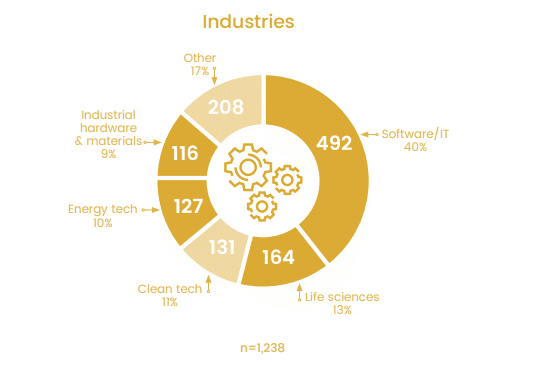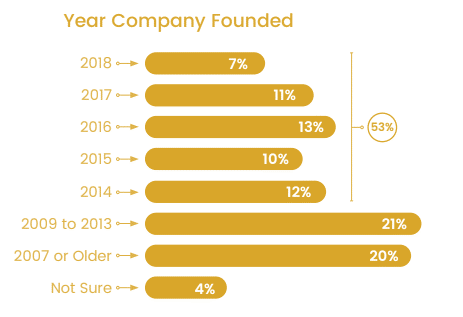
Navigating Edmonton's Tech Hub
5 items every start-up should have on their "to-do" list

The City of Edmonton is finding itself in the spotlight when it comes to their tech industry. CBRE has placed the city’s tech industry in their national top 10 rankings, due in large to the tech sector’s 26 per cent increase in jobs over the last five years, with 28,400 tech employees working in 2018.
With a continuously growing tech segment, Edmonton is ranked in the top five Canadian cities amongst 100 cities in the Tech Industry. According to StartupBlink, Edmonton is ranked 95th for the top startup cities in the world and has jumped 34 spots since 2017.
As of 2018, there were 1,238 technology companies in Alberta, with 394 from Edmonton.
Among technology companies operating in Alberta, the most common are software/IT companies (40%), life sciences (13%), cleantech (11%), energy tech (10%), and industrial hardware and materials (9%) companies. Over 50% of the tech companies in Alberta were started in 2014 or later.
Read Alberta Enterprise Corporation’s (AEC) full report


Artificial Intelligence - A world leader for over 25 years
The University of Alberta has been a world leader in machine intelligence for years, training the best researchers in the world. Its recruitment of top researchers pulls in top students from around the world in the tech segment. Companies like Google DeepMind and RBC’s Borealis AI have followed, and in 2017, the federal government named Edmonton one of the country’s three national hubs as part of its Pan-Canadian Artificial Intelligence Strategy. The University of Alberta now ranks third in the world and first in Canada for artificial intelligence research, after Carnegie Mellon University in USA and Tsinghua University in China.
At Crowe MacKay, our experts in the start-up and technology sector span across all our regions. Elvin Law, a Kelowna Partner, is a passionate leader for the firm, working with entrepreneurs in the tech industry.
It’s exciting to see Edmontonians plant more and more roots bolstering Edmonton’s role as a technology and startup hub. As many technology-centric start-ups will soon discover, (as they do in other parts of Canada) is that often their Edmonton roots will quickly grow into both national and international reaching branches.
Is your innovative solution gaining momentum?
As your company grows and evolves, here are 5 items that may show up on your “to-do” list quicker than you may anticipate:
1. Business structure
A common question to ask when you start a business is how do I structure it? Should I incorporate, start a partnership, or run things as “just me”? That question and can become more complicated if you’re selling, buying, or raising capital across borders.
Example: Do I do business in a foreign jurisdiction directly or through another entity/vehicle?
2. Founders’ rights and obligations
Many startups emerge from what began as just backroom conversations in a coffee shop between friends or colleagues. No matter the situation, where individuals come together with a common goal and start-up their business, a key consideration is agreeing on decision-making matters and “what-if” scenarios. That is where agreements like a shareholders’ agreement and considerations such as Board representation are important.
Example: Who does what and how is that compensated? What happens if we cannot agree on a matter or someone leaves?
3. Financing and cash flow
When sales are still just an idea, cash flow management and access to capital are critical. Whether there are programs to incentivize investment, creating realistic budgets, or accessing credits to help to reduce operating costs, exploring your potential options is important to help create as many funding opportunities as possible.
Example: For entities investing in research and development, refundable credits may be available based on costs already being incurred.
4. Regulatory compliance
With the first three items checked-off, a startup can focus on what it does best - grow its business. In the current environment, and with technology-centric companies especially, the “market” can quickly expand across borders. With it, comes a lot of cross border considerations. It is not just the Canada Revenue Agency that would like to collect taxes, fees, etc. — it is the same in other jurisdictions too. Knowing that you are on the right side of the rules is important to protecting your business’s momentum.
Example: Selling into other countries can trigger filing requirements even if you do not owe taxes. Also, certain funding sources may require specific standards of financial statements/information.
5. Expanded planning
The foundation is laid, but the future is unknown. Having the resources to plan ahead to keep your business flexible and efficient is a worthwhile endeavor. This can include many items but common ones include expanding your corporate group, income/asset planning for you and your family, and, at some point, estate planning.
Example: What is the future of your business? Sell it or keep it for the cash flow? Not sure? All these can be accommodated in one form or another with appropriate structuring and planning.
Edmonton Resources
“The resources Edmonton has to offer have been tremendously helpful in my own endeavors of becoming an entrepreneur. I have been supported through every step in launching my telemedicine start-up through the resources available in this city. From the idea incubation to running the business there have been experts willing to share their knowledge to help me succeed.”
- Aneesh Agrawal, Crowe MacKay Manager
Want to stay up-to-date on the start-up sector in Edmonton? Whether it’s the tech scene, entrepreneurial support, or local funding, the below resources can lead you and your innovative business to success.
News/Networking Resources for Tech startups:
Taproot Edmonton: Local journalism of the latest startup stories and upcoming entrepreneur-focused events.
Rainforest YEG: Entrepreneurs and local service providers working together to improve Alberta’s innovation ecosystem, including organizing frequent networking events.
Publicly funded organizations providing direct support to entrepreneurs:
TEC Edmonton: a joint venture between the University of Alberta and Edmonton Economic Development Corporation. TEC Edmonton is a business accelerator that helps emerging technology companies grow successfully. They help with raising funds, growing the entrepreneurs, scaling the businesses and protecting intellectual property.
Alberta Innovates: a provincially funded organization that focuses on building upon Alberta’s research and technology strengths. Alberta Innovates manages investment programs on behalf of the government and provides funding for startups and incubator programs.
Startup Edmonton: provides coworking space, mentorship, community events, and workshops to tech entrepreneurs and serve as a hub for tech and entrepreneurial meetups.
Local Funding
Sprout Fund: Sprout Fund was started in Edmonton and invests in seed- and early-stage companies. Investments range from $50,000 to $100,000 per company.
Alberta Enterprise: Alberta Enterprise has the Alberta Accelerate fund with $10million to invest in tech startups. It is a co-investment model where they match dollars from angel investors, typically up to $250,000.
Start the Conversation
Connect with one of our experts today.


